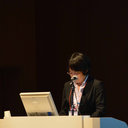Prognostic factors and clinical outcome of patients with lung adenocarcinoma with carcinomatous meningitis.
Ключевые слова
абстрактный
BACKGROUND
In recent years, the incidence of carcinomatous meningitis (CM) in lung adenocarcinoma has been rising. However, it remains unclear which treatment strategies improve the outcome of these patients.
METHODS
We retrospectively reviewed data for 67 lung adenocarcinoma patients diagnosed with CM between September 2002 and March 2011 in order to identify factors which would improve prognosis.
RESULTS
In multivariate analysis, the female gender, a good performance status (PS) 0-2 and the mutant epidermal growth factor receptor (EGFR) gene were identified as factors associated with a favorable prognosis. The survival time was significantly prolonged for patients treated with EGFR-tyrosine kinase inhibitors (TKIs) (240 vs. 57 days, p<0.0001) and for patients who underwent radiotherapy of the central nervous system (CNS) (201 vs. 76 days, p=0.0038) after diagnosis of CM. The median survival time (MST) of patients treated with gefitinib before diagnosis of CM and with erlotinib after diagnosis was significantly longer than the MST of patients treated with gefitinib both before and after the diagnosis of CM (407 vs. 205 days, p=0.0015). Patients treated with both radiotherapy for CNS and EGFR-TKI had longer survival compared to patients without radiotherapy for the CNS (379 vs. 122 days, p=0.032).
CONCLUSIONS
EGFR-TKI combined with radiotherapy may be a therapeutic approach capable of improving the prognosis of patients with lung adenocarcinoma with CM harboring the EGFR gene mutation.


